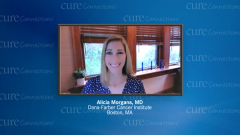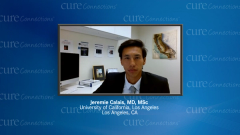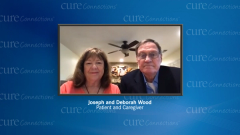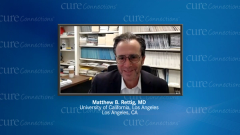
Support and Advice for Patients with mCRPC and Their Caregivers
Joseph Wood and his caregiver, Deborah Wood, provide advice for patients and caregivers with prostate cancer who may be in similar situations, and comment on the support they have received from their family and community.
Episodes in this series

Deborah Wood: Our community is helpful. I have an 86-year-old mother-in-law who drives a gold Jaguar, and she makes sure that when we get home from our five-hour trip from UCLA [University of California, Los Angeles], we have a big pot of goulash or something that takes us through a few days. The gentleman we just had over has taken care of a lot of Joe’s things. We’ve had alarms going off in our house, just the smoke alarms and things that need to have batteries reset, and he’s been a lot of help. Our neighbors take care of our house. You need a village to help you get through all this.
Joseph Wood: Our daughter works in a pharmacy, so she stays on us pretty good. She talks to us about cross drugs: what this drug does and what that drug does.
Deborah Wood: And what’s for nausea. She starts talking to her dad and then she’ll research it. Then Joe will talk to Dr. Rettig or his GP [general practitioner] about the drug that they had talked about. That’s been a big help to us.
Alicia Morgans, M.D.: It sounds as though you’re drawing support from the strengths of all the people in your community and family. And you’re learning new skills to get through some things that you didn’t expect you were going to face.
Deborah Wood: It’s nice because we have 2,600 people where we live. The mail lady knows I can call her, and she’ll stop my mail. I’m not sure if it would work out the same if we were in a large city. You don’t seem to have as many personal relationships, like with the guy who checks the electricity.
Alicia Morgans, M.D.: I’m glad you have those, and I appreciate you both for sharing your experiences in dealing with this and engaging with the health care community. Thank you.
Deborah Wood: Thank you.
Transcript edited for clarity.








